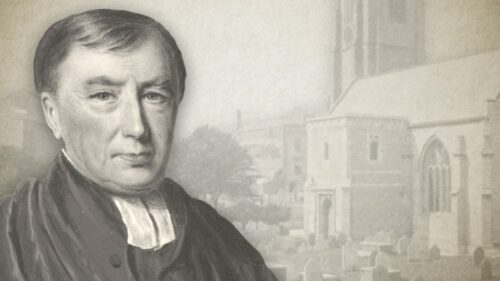
May 2—Morning Devotion
“And they called Rebekah, and said unto her, Wilt thou go with this man? And she said, I will go.”—Genesis 24:58
See, my soul, with what readiness Rebekah determined to accompany the servant of Abraham to Isaac. And wilt thou not arise and go forth at the invitation of the servants of Jesus, who sends them to call thee to his arms? Hath he not, by the sweet constraining influences of his Holy Spirit, as well as by the outward ministry of his blessed word, made thee willing in the day of his power? Did the servant of Abraham give an earnest of his master’s affection in putting the bracelets upon Rebekah’s hands, and the ear-rings, and the gold? But what was this to the love-tokens which Jesus himself hath given thee, when he set thee as a seal upon his heart, and as a seal upon his arm, and when all the waters of divine wrath his holy soul had poured upon him for thy sins, and all the floods of corruption, which like a deluge, had overspread thy whole nature, could not quench his love, nor drown it. And if it be demanded, then, from thine own mouth this day, “Wilt thou go with this man,” this Godman, this Glory-man, this Jesus? Wilt thou not instantly cry out, “I wilt go?” Yes! thou altogether lovely Lord, thou chiefest and fairest among ten thousand, I will go with thee. I would forget mine own people .and my father’s house. For my father’s house is an house of bondage. I was born in sin, and shapen in iniquity. A child of wrath, even as others, and by nature dead in trespasses and sins. It is thou, blessed Jesus, who hast delivered me from the wrath to come. It is thou who hast quickened me by thy Holy Spirit to a new and spiritual life. It is thou who hast sent thy servants to call me to thyself, and hast betrothed me to thyself for ever. And is there any that yet asketh me, “wilt thou go with this man? My whole soul would outrun the question, and, like the apostle, I would answer, “to whom else shall I go?” Witness for me, ye servants of my Lord; ye angels, and ministers of light. I have none in heaven, neither in earth, but him. Yes, thou dearest Redeemer! I will go with thee, follow thee, live with thee, hang upon thee, die with thee, nor even death itself shall part thee and me. Oh let those precious words of thine, concerning thy church, be sweetly, felt in my soul. “I will say, it is my people: “and my whole soul will make her responses to the gracious sound, and say,” the Lord is my God.”
Robert Hawker (1753-1827) was an Anglican (High-Calvinist) preacher who served as Vicar of Charles Church, Plymouth. John Hazelton wrote of him:
“The prominent features…in Robert Hawker's testimony…was the Person of Christ….Dr. Hawker delighted to speak of his Lord as "My most glorious Christ.” What anxious heart but finds at times in the perusal of the doctor's writings a measure of relief, a softening, and a mellowing? an almost imperceptible yet secret and constraining power in leading out of self and off from the misery and bondage of the flesh into a contemplation of the Person and preciousness of Christ as "the chiefest among ten thousand and the altogether lovely." Christ and Him crucified was emphatically the burden of his song and the keynote of his ministry. He preached his last sermon in Charles Church on March 18th, 1827, and on April 6th he died, after being six years curate and forty-three years vicar of the parish. On the last day of his life he repeated a part of Ephesians 1, from the 6th to the 12th verses, and as he proceeded he enlarged on the verses, but dwelt more fully on these words: "To the praise of His glory Who first trusted in Christ." He paused and asked, "Who first trusted in Christ?" And then made this answer: "It was God the Father Who first trusted in Christ."
Robert Hawker on the Biblical Covenants (Complete)
Robert Hawker's Poor Man's Morning Portions





